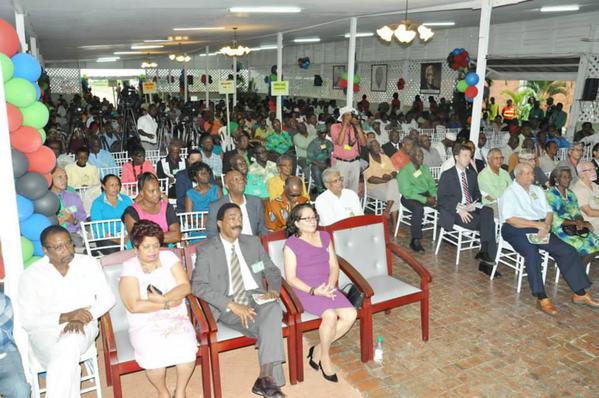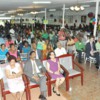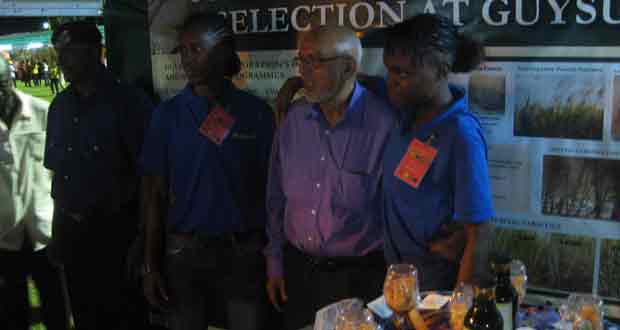Excerpt:
Guyana is facing a human development crisis as a result of the PPPC’s chronic maladministration. Public protests have become the visible and voluble expressions of resistance against the PPPC’s mismanagement of public health, public security, public works and public schools. Guyana, in the new millennium, has become more unsafe and more unstable than ever before, owing to the high rate of crime and the low quality of life.
The PPPC’s dismal 21-year record has ensured that Guyana remains an unequal and poor society in which a few people enjoy an extremely high income and most people endure an extremely small income. Four out of ten Guyanese are classified as poor of which three are considered to be extremely poor.
Guyana’s quality of life is low. Guyana, according to the UNDP Human Development Report 2014 – Sustaining Human Progress: Reducing Vulnerabilities and Building Resilience –has been ranked 121st out of 187 countries. That position is below war-ravaged Syria and Iraq and 62 places behind Barbados. Guyana’s crushing cost-of-living is holding our people back. The cost-of- living has increased three-fold under the PPPC regime.
Guyana is a corrupt country. The Transparency International Corruption Perception Index 2013, ranked us 136th out of 177 countries – 121 places behind Barbados. Growth is hampered by extensive corruption and lack of economic and employment opportunities.
Guyana is an unequal society. The PPPC administration’s attitudes and policies are harming social cohesion, undermining our sense of solidarity, impoverishing a large section of the population, alienating the hinterland regions and gradually creating ‘two nations’ instead of cementing One Nation.
Guyana’s population is in decline. Guyanese were shocked to learn that the nation’s population, according to preliminary results from the Report on the Guyana Population and Housing Census 2012, had fallen. It is now reckoned to be 747,884 – a decline of 3,339 from the 751,223 recorded for 2002, when the previous census was conducted.
Census results show, among other things, a significant drop in the number of persons living in the East Berbice-Corentyne Region (No.6). This is a region which the PPPC used to consider its ‘stronghold.’ But it is also a region where human safety has been seriously affected by contraband smuggling, murder, armed robbery, suicide and piracy. The Region’s population decline was mainly influenced by ‘emigration.’
The US Embassy in Georgetown confirmed the ‘emigration’ trend. The Embassy reported that, during the last decade – under the Bharrat Jagdeo and Donald Ramotar presidencies – it issued 46,540 immigration visas to Guyanese. The Embassy, therefore, has been issuing an average of 4,500 immigrant visas per year since 2004. It reported that 4,572 were issued in 2013 alone, a rate of more than one visa every two hours from this little nation. The flight of Guyanese to neighbouring countries – the Caribbean, Brazil, Venezuela and Suriname – has reinforced the causal connection between crime and emigration.
The economic crisis has lowered workers’ standard of living. Protests, strikes and stoppages by the country’s largest trade unions – the Guyana Public Service Union and the Guyana Agricultural and General Workers Union – have demonstrated how much labour relations between the state and its workers have degenerated. Workers are dissatisfied. The ranks of unemployed young people are increasing.
The World Bank, in its 2014 World Development Report, rated Guyana as the second poorest country in CARICOM. The Report showed that Guyana compared unfavourably with The Bahamas, Suriname and, indeed, with all other CARICOM states except Haiti.
Guyana’s economic development has been impeded. Its international competitiveness has been impaired – all because of the lack of major investment in public infrastructure. Collapsing stellings; an aging fleet of ferries; deteriorating hinterland airstrips; broken bridges; impassable roadways and weakened kokers and sea defences have all become major obstacles to everyday commuting, communication and commerce.
The truth is that the nation wakes up every morning to the dreary reality of shoddy road repairs, broken schools, an underfunded university, shaky institutions and a brigade of jobless dropouts. The truth, of course, is that the PPPC administration simply does not furnish the funds to confront the most serious challenges facing families. These are:
- the quality of education at the primary and secondary levels along the coastland and in the hinterland as well as at the University of Guyana;
- the unavailability of jobs for young school-leavers everywhere;
- the daily threats to human safety while there are 3 armed robberies every day, two murders every week and 12 fatal accidents every month; and,
- the threats of disease – chickungunya, dengue, filaria, gastro-enteritis and malaria – to public health.
These are the micro-economic fundamentals by which people live every day – having to stare at our schools, hospitals, police stations, the NIS and the unfriendly face of an uncaring state. The people worry about the everyday issues that confront them.
[SOURCE: STABROEK NEWS]





